|
|
|
Sort Order |
|
|
|
Items / Page
|
|
|
|
|
|
|
| Srl | Item |
| 1 |
ID:
166902
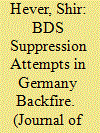

|
|
|
|
|
| Summary/Abstract |
German organizations are among the last Palestine solidarity groups in Europe to have embraced the call for Boycott, Divestment and Sanctions (BDS), launched in 2005. Pro-Israel German groups have been quick to respond with aggressive rhetoric equating a BDS-favorable stance with Nazism. The vilification of the movement has had the unintended consequence of inserting BDS into German politics, both at federal and local levels. Select case studies show that the BDS debate in Germany has developed somewhat differently than in other European countries, and that religious discourse is significant in shaping attitudes to Israel and Palestine. While the Palestine solidarity movement tends to single out the “Anti-Germans”—a pro-Israel formation that grew out of the Left after the reunification of Germany—as the major culprit, it is in fact conservative Christian, mostly Evangelical, organizations that are largely responsible for discouraging BDS activism.
|
|
|
|
|
|
|
|
|
|
|
|
|
|
|
|
| 2 |
ID:
166898
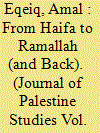

|
|
|
|
|
| Summary/Abstract |
This article explores border crossing and the Palestinian city as a literary metropolis—two major themes in the works of emerging Palestinian novelists in Israel. It looks at the “re-Palestinization” of urban space by writers who belong to a post-Oslo generation of Palestinian intellectuals that left villages and small towns in Israel to go and study, work, and live in the city. What distinguishes the literature of this generation is its negotiation of border crossing in a fragmented geography and its engagement with the city as a space of paradoxical encounter between a national imaginary and a settler-colonial reality. Based on a critical reading of their works, the article argues that Adania Shibli and Ibtisam Azem challenge colonial border discourse, exposing the ongoing Zionist erasure of the Palestinian city and creating a new topography for Palestinian literature. The article also traces the role of these writers in the “twinning” of Haifa and Ramallah starting in the late 1990s, and it examines how this literary and cultural “sisterhood” informs spatial resistance.
|
|
|
|
|
|
|
|
|
|
|
|
|
|
|
|
| 3 |
ID:
166899
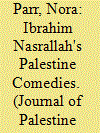

|
|
|
|
|
| Summary/Abstract |
Conceptually linked, noncontiguous, and undeniably national, Ibrahim Nasrallah's book series Al-milhat al-filastiniyya (The Palestine Comedies) breaks conceptual ground. Told across twelve volumes, the Comedies represents the long-called for Palestinian national novel, though in unconventional form. The series uses diverse literary devices, including intertextuality and the archetype of the twin, to demonstrate how formal innovations can redirect assumptions about what constitutes not only a national novel, but also a nation. The series reimagines relationships between space, time, and people, giving narrative shape to a community so often imagined as fragments. Abandoning the retrospective prerequisite of bounded sovereign space and homogeneous, linear time, the Comedies imagines a “nation constellation.” A close examination of two novels within the series, A'ras amna (2004) and Tifl al-mimhat (2000), shows how Palestinian relationships can be imagined outside existing national logics. It reads the constellation as an alternative nation form that can both encompass colonial frameworks and free the delimitation of Palestine from the dominance of power structures that only begin with the nation-state.
|
|
|
|
|
|
|
|
|
|
|
|
|
|
|
|
| 4 |
ID:
166900
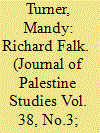

|
|
|
|
|
| Summary/Abstract |
Richard Falk's quest to combine academic scholarship with political activism is witnessed throughout his lifework, but perhaps especially so during his tenure as United Nations special rapporteur on human rights in the Palestinian territories occupied since 1967, a position he held from 2008 to 2014. Falk is a vocal critic of Israel's occupation and a staunch supporter of Palestinian selfdetermination, positions that have drawn strong condemnation from Israel and its supporters, but praise from Palestinians and their supporters. There is little doubt that Falk's work has had a huge influence on public debate and activism pertaining to this issue, both within Israel-Palestine as well as globally. This article outlines Falk's scholarship and activism regarding Palestine, analyzes the post of UN special rapporteur in general, reviews both criticism of and support for Falk's work, and assesses Falk's concept of the “citizen pilgrim.” It concludes by reflecting on what this reveals about the experience of praxis for politically engaged academics.
|
|
|
|
|
|
|
|
|
|
|
|
|
|
|
|
| 5 |
ID:
166897
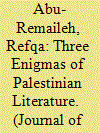

|
|
|
|
|
| Summary/Abstract |
As an introduction to the Journal's literary feature, this contribution aims to shed light on recent scholarship on Palestinian literature with a view to integrating discussions of literature more concretely within the broader field of Palestine studies. The contribution structures the discussion of the articles by Amal Eqeiq and Nora Parr around three enigmas that preoccupy scholars of Palestinian literature: writing a national literature without a nation-state, writing silence and nonlinearity, and writing fragmentation and wholeness. It highlights that challenges for scholarship on Palestinian literature revolve around rethinking conventional categorizations, canonizations, and periodizations to better understand how a national literature emerged in a context of exile, fragmentation, and statelessness, and how processes of cultural production operate in extranational conditions.
|
|
|
|
|
|
|
|
|
|
|
|
|
|
|
|
| 6 |
ID:
166901
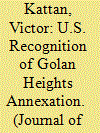

|
|
|
|
|
| Summary/Abstract |
On 25 March 2019, U.S. president Donald Trump signed a proclamation recognizing the occupied Golan Heights as part of Israel. The Golan Heights proclamation, which endorses Israel's annexation of the territory captured from Syria in the 1967 war, was issued two weeks before the Israeli general election in a photo-op with Prime Minister Benjamin Netanyahu at the White House. Undermining internationally agreed-upon norms prohibiting states from recognizing the annexation of territory by force, the proclamation could have detrimental consequences for the international legal order, providing a precedent for other states to take steps to annex territory they claim is necessary for their defense.
|
|
|
|
|
|
|
|
|
|
|
|
|
|
|
|
|
|
|
|
|